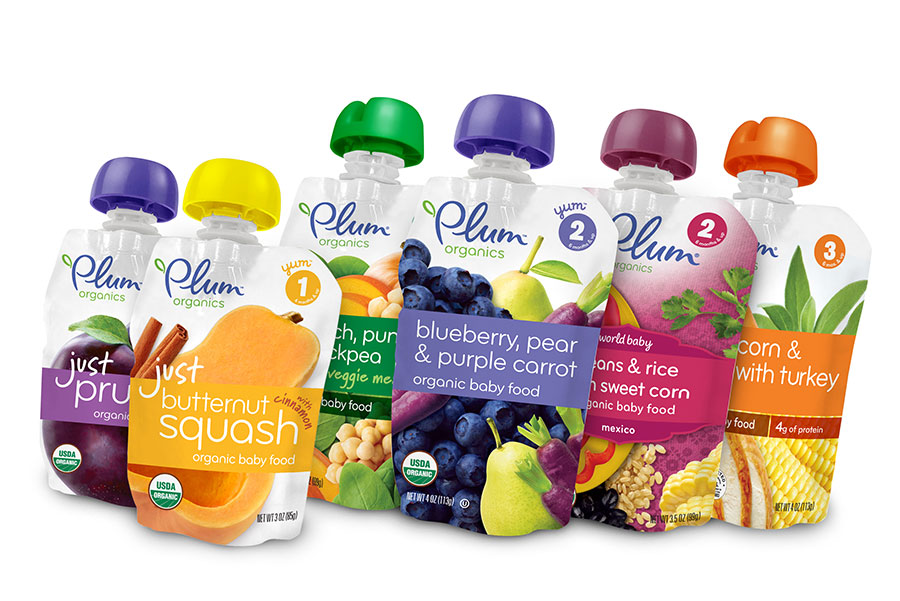- A young parent sees no innovation or healthy alternatives in the depressing baby food market around him.
- He sees no reason why toddlers shouldn’t eat the same healthy, organic food as their parents.
- Knowing he’s not alone, he becomes a leader among a nation of parents seeking better nutrition for their kids – in the process taking on established industry giants.
- Neil Grimmer perfects an organic meal-on-the-go for modern families, with an innovative soft pack that has become an industry standard.
- Plum Organics generated $93 million in gross sales in 2012 alone, while reducing carbon footprints and growing healthy kids.
You’re never too young to start eating organic. At least, that’s what Neil Grimmer (pictured above) wants us to believe. For all those kids out there still wearing diapers and looking for healthy food while avoiding poisoning themselves with the synthetic chemicals of most diets, Grimmer has the perfect solution. He’s the cofounder of Plum Organics, the number one organic baby food company in the U.S. (now a unit of Campbell Soup Company) that has launched a range of meals to help remedy the situation; at the same time lessening the chance of mum’s having spoons smacked from their hands from force-feeding tasteless meals.
Grimmer is the perfect person to answer the question: “If your food could talk, what would it tell you?” He’s been hard at work since 2007 experimenting with baby food that is both inspirational and highly nutritious. As a working parent, Grimmer and his wife had spent evenings pureeing fresh vegetables for their two young daughters to ensure they could enjoy the same great tasting food they themselves enjoyed. “The jarred baby food at the time was just too bland and lacked any tasteful inspiration,” says Grimmer. Taking the lead, he gathered a small group of parents together and they began to reimagine the baby food category.
The incredible growth of children during the first years of life, and the role of good nutrition in deciding whether kids head towards health or away from it later in life, was a key consideration for Grimmer. He knew that the older a child became the harder it was for them to develop a taste for healthy food. Once the sugar and salt in unhealthy alternatives kick in, it’s very difficult to acquire healthy habits again. He calls the early adoption of this healthy taste preference “Nutritional Intelligence” and considers it no different to any other intelligent choice you’d make for a better life.
Remarkably, the group took on some of the leading global players in the food industry, such as Nestlé, that owns Gerber – a dominant force in the U.S. baby food market. “It was pretty audacious and probably a little naive to imagine that a small group of parents in the San Francisco Bay area could challenge that category,” says Grimmer. Yet after only eight years they have become the number one organic baby food brand in the country.
“At the time I was leading some major food projects for Pepsi and MacDonald’s as part of my role at a major innovation and design firm,” recalls Grimmer. “I was trying to figure out what health and wellness looked like and after my first daughter was born I started experimenting with some of these ideas in our home kitchen.”

“I was part of an emerging group of parents that didn’t want to compromise food quality, was very progressive about what we fed our kids and recognized the importance of early childhood nutrition,” says Grimmer. The group didn’t do any market testing; they went purely on the growing trend they saw among parents.
They went beyond organic fruits and vegetables and added culinary-inspired ingredients too, such as kale (wild cabbage), quinoa (a grain superfood) and amaranth (a high-protein seed). Plum Organics is now the largest purchaser of amaranth in the world.
Grimmer’s background in product design played a major role in getting the product liked and noticed. His training had focused on understanding the needs, wants and desires of those he wanted to serve, and then to use those principles to make products. Grimmer leveraged a spouted pouch with a feeding spout and pioneered it for the baby food category, that has now become the industry standard. All that was available at the time was a glass jar with metal lid – the dominant design in baby food of the last 60 years. “Young parents with children are more mobile than ever before,” says Grimmer. “Nutrition that is portable and flexible enough to fit into various carry bags is key.” The design of the spout also tapped into the natural feeding intuition a baby has from breastfeeding.

Initially distributed at Whole Foods, Grimmer was surprised at how quickly the brand grew. But it really took off after he managed to get his most disruptive product into Babies R Us – the aforementioned spouted, soft-pack container. This radically new packaging that was now endorsed by a leading infant retailer created, “organic for the masses,” as Grimmer explains. No longer a niche product, it was seen by consumers as a good mainstream alternative. Pre-acquisition, Plum Organics experienced tremendous growth, generating $93 million in gross sales in 2012 alone.
Most retailers had baby food on their shelves because it was a necessity for parents, but everyone was losing money. Low pricing ruled the day and margins were slim. “Depressed categories are depressing,” says Grimmer. “There was no innovation, no excitement. No one was investing in ideas to come up with a parent-centered or kid-centered solution. Subsequently, the quality of ingredients suffered too.” The fact that there’s a 28 percent price difference between organic baby food brands and conventional brands has not stopped parents from buying it. Grimmer gambled on an assumption that most parents would choose to buy pricier alternatives for the sake of a healthier child, and he was right.
Why is organic good?
- It’s better for nature. Organic farming uses fewer pesticides and encourages healthy soil. This builds a stronger natural resistance to pests and disease. This type of farming releases less greenhouse gases, resulting in a reduced carbon footprint.
- High animal welfare. Organic means free range. Animals are given plenty of space and fresh air to grow more naturally. Healthier animals mean less drugs and antibiotics. Great for the animals and also your peace of mind.
- More natural food. Genetically modified (GM) foods are banned in organic farming, as are hydrogenated fats, artificial pesticides, aspartame, tartrazine and monosodium glutamate. Organic is a more natural choice.
- Great tasting food. Organic farmers rely on developing a healthy, fertile soil. This results in crops that are bursting with flavour and taste great too.
Do you eat organic food? What do you think about Neil Grimmer’s view that kid’s should eat organic too? We’d love to hear your thoughts in the comments section below.




































